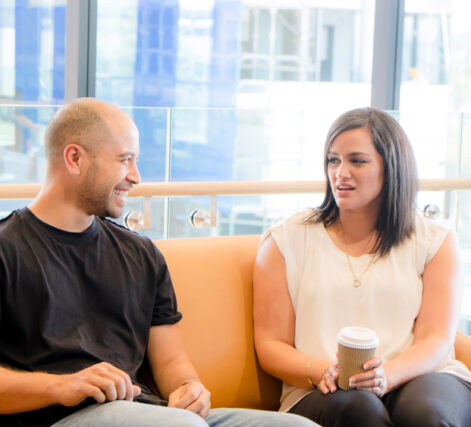Being socially awkward doesn’t mean you’re doomed to uncomfortable conversations forever.

You don’t have to just settle for wishing a hole would open up in the earth and swallow you up. There actually ARE things you can do to help increase your social skills and feel a bit more confident in social situations. Here’s what you need to know to help you get there.
1. It’s okay to be nervous in social situations.

Feeling anxious about socialising is common, even for people who seem confident. Many people feel nervous in new situations or when meeting new people. Recognising that this is normal can help you feel less alone. Don’t beat yourself up for feeling anxious. Instead, focus on taking small steps to engage despite the nerves.
2. Most people are focused on themselves, not on judging you.

It’s easy to feel like everyone is watching and judging your every move, but the truth is, most people are wrapped up in their own thoughts and concerns. They’re probably not noticing your awkwardness as much as you think. This realisation can help you relax and worry less about how you’re coming across in social situations.
3. Practice makes progress.

Social skills are just that — skills. They can be improved with practice. Start small by engaging in brief convos, like chatting with a cashier or asking a colleague about their weekend. Each interaction, no matter how brief, helps build your confidence. Over time, these small steps can lead to significant improvements in your social comfort.
4. It’s fine to take breaks during social events.

If you find social situations draining, it’s okay to step away for a bit. Take a few minutes alone to recharge, whether it’s a quick trip to the bathroom or a brief walk outside. This can help you feel more relaxed and ready to engage again. Don’t feel guilty about needing these moments of solitude.
5. Having a few go-to conversation topics can help.

Prepare a few general topics you can bring up in conversations. Current events, hobbies, or asking about the other person’s interests are good starting points. Having these ready can ease the pressure of coming up with things to say on the spot. Just remember to listen and respond to keep the conversation flowing naturally.
6. Body language matters more than you might think.

Your posture and gestures communicate a lot. Try to maintain open body language — uncross your arms, make eye contact, and smile. These simple changes can make you appear more approachable and confident, even if you don’t feel it inside. Practice these in front of a mirror to get comfortable with them.
7. It’s okay to admit when you’re feeling awkward.

Sometimes, acknowledging your discomfort can actually ease tension. A simple “I’m a bit nervous, but I’m glad to be here” can be disarming and relatable. Many people appreciate honesty and might even share that they feel the same way. This openness can create a more relaxed atmosphere for everyone.
8. Listening is just as important as talking.

Good conversation isn’t just about what you say — it’s also about how well you listen. Focus on really hearing what other people are saying instead of worrying about what to say next. Ask follow-up questions to show you’re engaged. This takes pressure off you to constantly come up with new topics and helps build deeper connections.
9. It’s fine to excuse yourself from uncomfortable situations.

If you find yourself in a social situation that’s making you extremely uncomfortable, it’s okay to leave. You don’t need to stay somewhere that’s causing you distress. Have a polite exit strategy ready, like saying you need to make a call or head home for an early start tomorrow. Prioritise your well-being.
10. Not every conversation will go perfectly, and that’s normal.
 Source: Unsplash
Source: Unsplash Even the most socially adept people have awkward moments or conversations that don’t flow well. Don’t dwell on these instances or see them as failures. They’re just part of being human. Instead of replaying awkward moments, focus on the things that went well, no matter how small.
11. Finding common ground can ease social situations.

Look for interests or experiences you have in common when talking to other people. This could be anything from a favourite TV show to a shared hobby, or even just living in the same area. Having something in common gives you an easy topic to discuss and can help you feel more connected to the person you’re talking to.
12. It’s okay to take your time when responding.

You don’t need to reply instantly in conversations. It’s fine to take a moment to gather your thoughts before speaking. This can actually lead to more thoughtful responses. If you need a moment, you can use phrases like “That’s interesting, let me think about that for a second” to give yourself time to formulate your response.
13. People appreciate kindness more than perfect social skills.

Being kind and genuine is more important than being smooth or witty. Small acts of kindness, like offering help or showing concern for people, can make a big impression. These actions often matter more in building relationships than having perfect social skills. Focus on being a good person rather than a perfect conversationalist.
14. It’s fine to have different social needs.

Some people need more alone time than others, and that’s okay. Recognising and respecting your own social limits is important. Don’t force yourself to be more outgoing than you’re comfortable with. It’s perfectly fine to prefer smaller gatherings or one-on-one interactions over large social events. Honour your own needs.
15. Ask for support if social anxiety is severely impacting your life.

If social awkwardness is causing significant distress or interfering with your daily life, it’s okay to ask for help. Talking to a therapist or counsellor can provide strategies to manage social anxiety and improve your confidence. Remember, getting the help you need is a sign of strength, not weakness.




